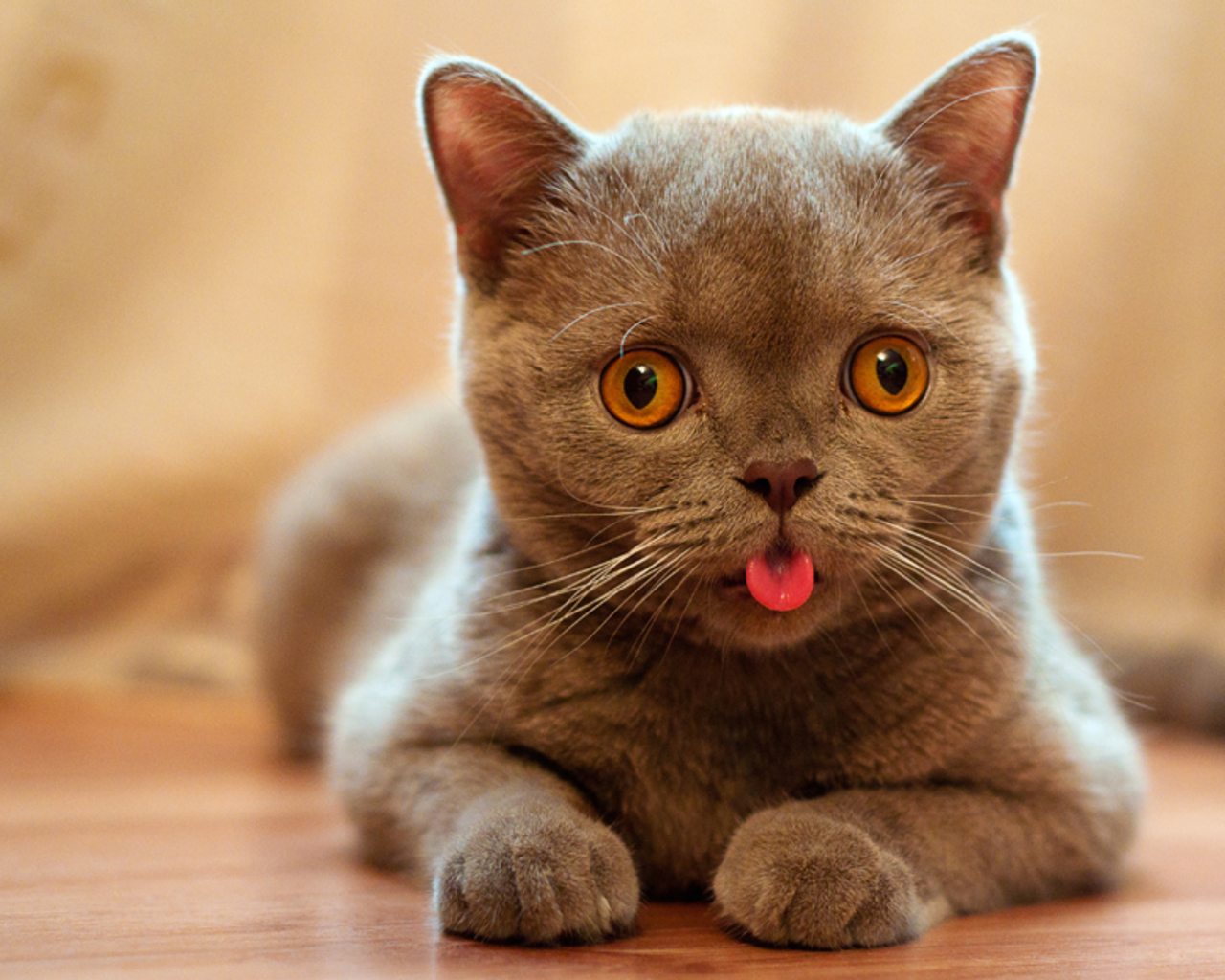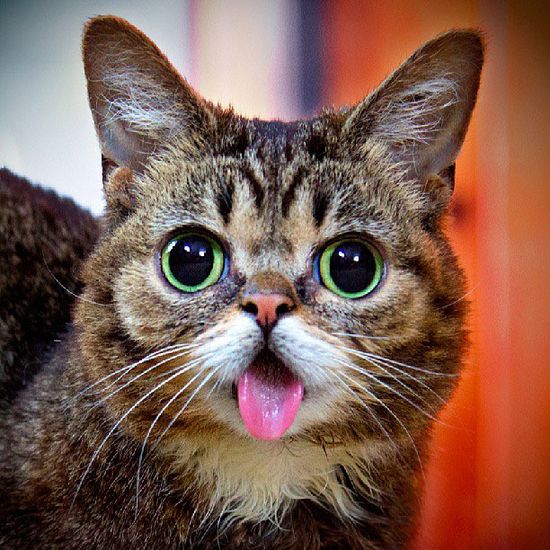Is your cat sticking its tongue out getting you worried? Read this article to find out what it might mean or indicate.
Cats are curious and funny animals. They are always up to some unpredictable and random shenanigans. They do so many things, but why do they do any of them? Cat behavior is definitely confusing and interesting with “blepping” being one of the most common ones.
Before we get into WHY cats might behave this way or blep, let’s look at some facts about the cat tongues.
Some Facts about Cat Tongue:

➤Since cats use their tongues to clean themselves and fur, it is very dry and rough. It is almost like a wet hairbrush.
➤The surface of their tongues is covered with tiny barbs called papillae. They are larger near the center of the tongue and smaller on the sides, which helps them eat. Their tongue is rough, which makes grooming easier. Their tongue is covered by something called keratin. We also have keratin in our nails. Keratin makes up their tongue muscles. If a cat licks you in the same spot for too long, it feels like a scratch.
➤ Cats can’t taste salt or sweet things. They lack the taste buds! Don’t put chocolates in your cat’s food bowl because they won’t be a treat if he can’t taste them. Chocolate is lethal to cats.
➤The papillae in their tongues enable them to rub the meat off of their prey’s body. Yup, those things are surprisingly sharp! It is also what helps the larger cats, such as tigers and lions, scrape meat off of animals they feed on. Of course, cats are less rough than lions and tigers. It is pointed towards the inside of their mouth to enable this function.
➤ Cats use their tongues for grooming. They also lick other cats and humans as a form of bonding or for comfort. That is how they show love and interact!
➤They also use the papillae to drink water. Due to the papillae on their tongues, cats cannot dip their hands in water or put their entire mouth in, so they must dip their tongues into it. This allows them to pull in more water. Lapping is the act of dipping the tongue in water and pulling it back. Cats can lap up to four times per second. That is some fast lapping! As a result, papillae help them drink water much easier than it appears.
➤They stay safe and survive thanks to their tongues. Cats are especially concerned about grooming. In the wilderness, leaving food particles on the body is an invitation to predators. They wouldn’t want that, would they?
➤ Cats use their tongues for grooming to decrease body temperature. It is similar to how humans sweat as a cooling mechanism.
Why do cats stick their tongues out?

Do cats stick out their tongues for any good reason in particular? Or is it also random and playful like most of their other activities? Does it reflect a symptom of a health condition?
Well if you own a cat, it is definitely time to try to find out!
It can mean quite a lot of things actually. Sometimes it can be something silly and not worrisome at all.
But sometimes it may also be a symptom of a serious health problem that requires a visit to the vet.
Don’t try to fix serious problems at home by consulting the internet!
Always choose the vet over your amateur self because we can’t risk our pet being experimented on, especially when it is in pain or discomfort.
You should use the internet to be aware of the symptoms and to know when to visit the veterinarian.
Some harmless reasons for cats to stick their tongues out are explained in this article.
The cutest reason for cats sticking the tip of their tongues out, which is also informally known as a “blep” on the internet- is their emotion.
They tend to do this when they feel curious about their environment or surroundings.
Any cat owner knows that mood. She will blep and look fascinated if she feels amazed enough. You might think of it as the cat version of a wow face.
Yup, we’ve all experienced those before; sticking the tongue out and forgetting to put it back in due to awe.
If your cat is sticking its tongue out during a nap, there is absolutely nothing to worry about.
That can happen if she is dreaming of sweet food! It is natural for the tongue to hang out when a cat is sleeping or is relaxed.

An interesting reason for a blep in your cat could be a missing tooth!
In a cat, a good oral structure would allow for comfortable placement of the tongue.
If a tooth is missing, maybe at the bottom of the jaw, the tongue may slip out involuntarily.
Your pet just can’t help it! Persian cats and flat-faced cats are more likely to develop this condition.
This is because there is less mouth space to keep the tongue in and it easily falls out.
Another tongue-sticking-out behavior that is known as the “Flehmen response” happens when your pet is in awe of something. And that is when you see the cute blep!
It helps them analyze smells and signals they’re curious about or interested in.
Smell signals are collected by the mouth. Cats also use this sense to pick up mating calls. Scientists believe that these are the chemical signals and impulses that allow them to identify which environment to feel safe in.
There could be other more serious reasons too. We know that cats groom themselves using their tongues.
The specific design of their tongue is the reason why they might end up getting undesirable dirt stuck there.
Your cat might have some food or hair, disturbing particles, or objects stuck in her mouth.
If you spot her sticking her tongue in and out constantly, it definitely means she is trying to get something out that is stuck. Or that is simply something she didn’t like the taste of.
Sometimes it may also indicate dementia in older cats (yes, cats can also suffer from dementia at an old age!) if you see your cat is forgetting to put her tongue back inside! Dementia is the condition where memory, thinking, and behavior power deteriorates.
If you find her sticking her tongue in and out for quite some time, say for more than 2 minutes, then maybe you should check it out a little. She might have a tongue wound or a lesion that needs attention.

Tongue sticking out can also indicate a number of oral problems. For example gum disease, plaques, tooth decay, gum or tongue inflammation, and gingivitis.
This behavior may also be a symptom of stomatitis in your feline. It is a condition of inflammation of the mouth and lips.
This condition leaves cats panting and drooling and sticking their tongues out because it is painful to keep them inside.
Your pet might also be having difficulty eating. If you think this is the case for your own furball, then it is time to visit the pet doctor.
Even though it is not very common, it is quite painful. The sooner you go for a visit, the less pain your pet has to go through.
Your cat may have ingested a rat with poison in its system or swallowed some chemical that has led to poisoning. Ingesting toxic flowers can also cause poisoning.
Sticking the tongue out is a symptom of this in felines. Watch out for vomiting and dizziness too and immediately consult a vet to cater to your cat’s immediate needs.
If your cat wags the tongue back and forth, it may also mean that it is suffering from breathing problems.
Check if your cat gets short of breath often, which is also a symptom of sinus, throat, or nose infection.
If your cat is having a hard time breathing, you need a professional to diagnose his or her lungs. Look for other symptoms of infections when you suspect your cat of having it.
These would include fever, poor balance, and lowering interest in grooming.
Cats are known to wag their tongues if they feel disoriented. For example, when you take your cat somewhere in a vehicle, it may suffer from motion sickness.
You’ll know it when you see the tongue rolling out often. It might be helpful to let your pet walk around a little and regain balance and confidence. Or you can opt to stop moving the vehicle altogether for a small break.
Going to new places can also make some cats uncomfortable and nervous. That is when they pant and stress out, quite visibly.
It would be a wise idea to comfort your pet right then or just take it back home to relax.
Sticking the tongue out is also a symptom of a heat stroke in cats.
Your cat would be seen trying to groom unusually to try to get cooler or desperately trying to find a cool place.
Help out your little friend if you see these symptoms before he collapses and falls down helplessly.
Severe cases of heat strokes can result in a red tongue, vomiting, panting, lack of activity, fast breathing, and so on. Prevent these extreme conditions by recognizing early symptoms. Otherwise, it may cause general organ failure.

This is also another reason why heatstroke is actually a very serious concern. The normal body temperature of cats is 101-102 degrees Fahrenheit. Any temperature above 105 degrees increases the chances of your pet suffering from heatstroke.
If your pet has already reached the late symptoms of having a heat stroke and has collapsed, get help immediately.
Help lower the body temperature by wiping the cat with a wet towel and immediately make him or her drink lots of water.
Heat strokes are more common among long-haired felines, the older ones, and also obese ones.
In a nutshell, when you see your cat’s tongue sticking out too often, it is time to observe and investigate further.
If it falls under the harmless and cute category, feel free to take adorable pictures and post them on your social media accounts!
We can’t possibly ignore the little signals that our pets send us for help, only because we didn’t know better! What else is the internet for?

